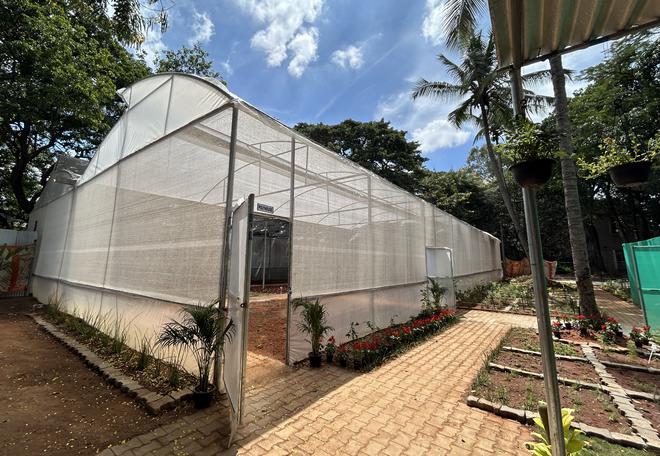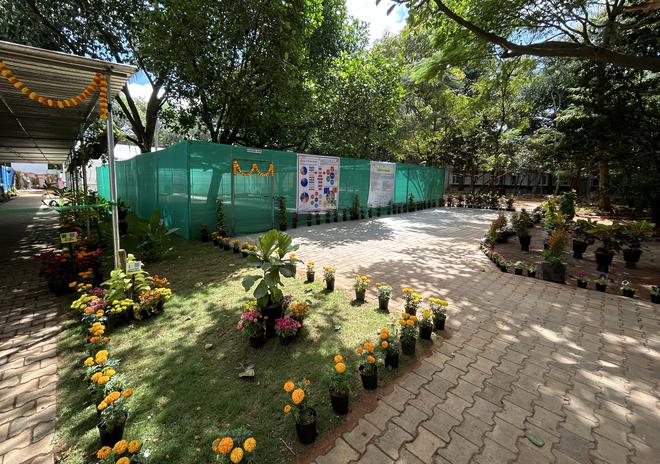Gardening, it is widely believed, has therapeutic value. The Inclusive Sustainable Horticulture Centre launched in Bengaluru last week works on this principle and seeks to help people with physical and metal health issues with what is called “horticulture therapy.”
On the inaugural day on November 3, men and women with autism, down syndrome and other mental and physical disabilities learnt the basics of gardening such as sowing seeds and planting saplings at the Government Institutions Complex, Department of Women and Child Development. The centre has been started by the Association of People with Disability (APD), in association with the Department of Women and Child Development, Government of Karnataka, and Robert Bosch.

Sustainable livelihood
The Inclusive Sustainable Horticulture Centre is a project designed to provide sustainable livelihood opportunities for residents of the Correctional Institutions Complex (CIC), a facility that houses individuals with diverse needs, including intellectual disabilities, women and children who have been rescued from abuse, abandonment, forced labour, and other such circumstances. The project’s scope expanded to include eco-therapy for intellectually challenged men and women and environmental education for children at the boys’ and girls’ homes within the complex. The programme also aims to address environmental concerns by introducing a wet waste management solution that utilises kitchen waste generated within the complex.
APD, in April 2023, initiated a livelihood programme under which the Inclusive Sustainable Horticulture Centre has been opened, the programme has already shown significant promise in providing holistic support and sustainable opportunities to those in need, says the organisation. So far 115 beneficiaries have been selected out of 425 residents among the seven homes in the complex. The beneficiaries will be trained in gardening and plant nursery activities to develop skills and provide eco-therapy. The activities will also help the beneficiaries build eye-hand coordination, improve cardiac health, build problem solving skills, improve sense of wellbeing and a lot more.
Speaking to The Hindu, Dr. Senthil N.S. Kumar, Chief operations officer and executive officer, APD, said the programme will not just help them develop skills but also help beneficiaries look for jobs to make a livelihood.

Comprehensive approach
“APD caters services to people with all kinds of disabilities under the Rights of Persons with Disabilities (RPWD) Act, 2016. We address issues faced by those with disabilities comprehensively. Which is why we feel eco-therapy could help those with physical or mental disabilities to lead a better life. Bengaluru being a garden city, we felt there are a lot of job opportunities for those with gardening skills.“
“The beneficiaries with physical disabilities or mild mental disabilities will be trained in this horticulture program for six months, and we will place them as gardeners and garden supervisors at various organisations. We hope that through this programme, someone who has been considered a burden by their family will be able to be productive, be economically independent, take care of themselves, and support their families,“ said Kumar.
“Assistive and adaptive devices will be used in the program, which means gardening tools and equipment will be specially made and modified to make sure beneficiaries do not self-harm themselves. We also want to make sure that the program is accessible to those on and off wheelchairs. The entire horticulture centre is accessible on the wheelchair and at the ground level, for people who can not use wheelchairs too. An occupational therapist will also be deployed in the project by whom everything will be overlooked,” Dr. Kumar added.
APD was established in 1959 by the late N.S. Hema. APD has impacted over six lakh people with disabilities from underprivileged communities and rural backgrounds. With a diverse and inclusive team of over 230 members, APD reaches out to over 1,00,000 direct and indirect beneficiaries, annually, according to the organisation.







